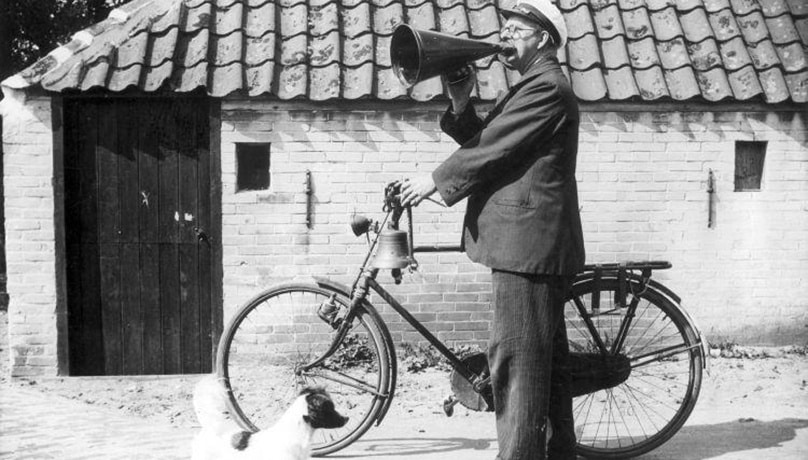Event Websites & Platforms: getting your event online
Marketing your event online is essential driving event awareness and increasing attendance. One of the best ways to market your event is through an event website – either your own dedicated website or webpage, or posting your event on an event listing site. An event website can get your event seen by relevant people, allow you to better predict attendance numbers and help you to be agile when it comes to communicating event updates.
In this article, we’re going to explore the best way for you to utlise an event website. Read on to find out more.
Creating event websites & event listings
Marketing an event via a website is a great way to get high, relevant exposure and drive attendance. However, not all of the options will be suitable for your event. Depending on the size, regularity and theme of your event, there will be different ways to use websites to promote it. Below are some of the main options.
Event websites – a dedicated website for your event
Event websites are great for big, recurring events that already have a lot of general awareness built up around them. These are events that people will search for throughout the year, regardless of how regular the events are.
For example, a music festival or an annual industry conference would be the perfect type of event to benefit from a dedicated event website. This is because people want to find out specific information about the upcoming event throughout the year. A website is a powerful way to communicate updates, exciting news and general information year-round tailored to your audience. You will want to consider a year long marketing plan that includes creating relevant content that will be of value to your audiences.
An example of an annual event that benefits from a dedicated event website is London’s Comic con. The event attracts thousands of visitors from around the world each year. Due to its size, the type of speakers that attend and the excitement of the attendees, people look for information about it all year round. Having a dedicated event website means London Comic Con is:
- Always available to give information about the event, returning relevant information for users’ search queries, and making sure users’ needs are met.
- Offering a space where the event can provide valuable content on themes relevant to the audience, therefore establishing its authority in the sector
- Providing a relevant space to advertise spin off and sub-events
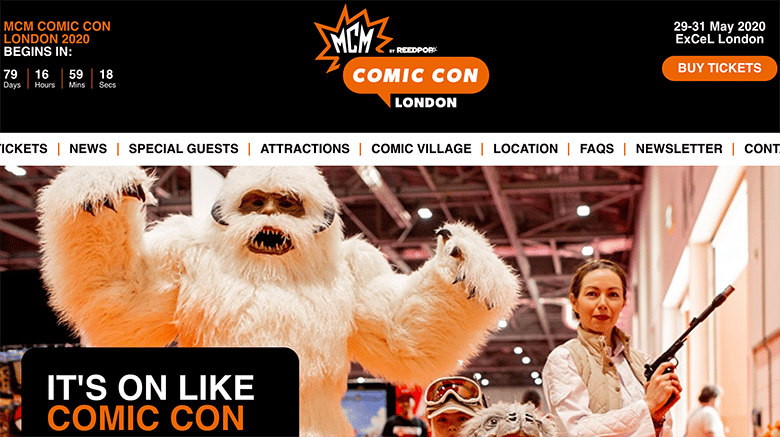
Event pages – an event page on your website
If your business or organisation hosts ad hoc events as part of its overall marketing activity, then you’re unlikely to need a dedicated event website. Instead, you should consider adding a page or section to your business website as a way to drive event awareness and attendance. The page can list all upcoming events and even include details of past events.
Event pages on websites work especially well for businesses planning one-time events that people aren’t aware of yet. You can then use paid advertising and email marketing to drive relevant audiences to the page.
For example, if your business is hosting a one-off think tank, webinar, symposium, or charity dinner dance, it’s unlikely that people will be searching for it or already know that it’s going to happen. Therefore there’s no need to create a whole website to communicate the logistics of the event year-round.
Instead, you can create a designated page on your business website that has all the information potential guests will need. Then, you can promote that page via social media, paid search and other forms of biddable media to get the word out about the event. And, as the event page will form part of your website, you’ll be able to see the number of people who visit the page through your own website’s analytics. This gives you the opportunity to keep an eye on how many people are interacting with and are interested in your event.
Event listing on a platform
Event listing platforms offer a brilliant way to market events online. They also provide many practical benefits in that they allow you to list and ticket your event for a small fee.
Listing platforms come with the added benefit that people use them to actively seek various events in their area depending on their interests. This provides you as the event organisers with a way to get your event in front of the right audience.
The most common event listing platforms include:
These sorts of event listing platforms can work well for many reasons, including:
- Helping you to reach people who are searching for events like yours
- Providing ways to distribute tickets to the event, whether they’re charged for or free
- Calculating the number of likely attendees
- Helping you to keep in contact with attendees and providing updates
You can also share these pages on social media, driving people to the event listing page instead of a website or a web page on your business’ website.
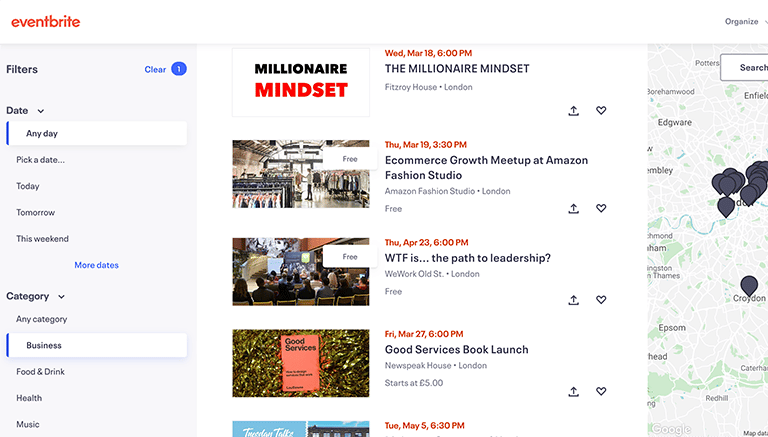
Facebook event pages
Facebook event pages offer an excellent way to get the word out about any event – big or small. They can be used alone or in conjunction with dedicated event websites, website pages and postings on event listing sites.
Facebook event pages work particularly well at reaching new audiences who might not have heard about your event. This is because Facebook’s algorithm works to find people that match the same interests as your events. It also shows events to friends of people who are interested in or going to events.
On top of that, the social network even has a dedicated section to help people find events in local areas. even allows advertisers to promote events to specific audiences to generate even more awareness.
For more on Facebook marketing for events read our guide to Facebook for event planners.
Why create an event website?
There are lots of reasons to create an event website, especially if you’re planning a large scale, recurring event.
By having an entire website dedicated to your event, you give yourself enough space to go into thorough detail about your event. You can have sections on the site to answer questions and provide different types of related content (such as blogs, video, images etc) that will interest and entice your audience.
In fact, there are many more benefits of event websites. These include:
- Making your event and event brand seem more authoritative
-
- Event websites show attendees that your event is established and trustworthy
- They can also help to build and reinforce your event brand
-
- Maintaining a permanent presence throughout the year and gaining SEO authority
-
- Even if your event only takes place once a year, a website can help you gain more authority on search engines. This means that you’re more likely to be visible for related search terms as the years roll on.
-
- Being relevant all year round
-
- Having a website with updated content shows that your event brand is valuable all the time – even though it only takes place once a year. A good event website can capture new attendees a whole year before the event takes place.
-
- Being optimised to appear in search engines for related queries
-
- You can optimise a dedicated event website to show for search queries related to your event and capture more search traffic – therefore widening your potential audience
-
- Easily updating attendees about event information
-
- Having a website allows you to communicate updates and news easily. You can also capture people’s email addresses, allowing you to use your website data to send out newsletters and emails. Read our guide to email marketing for events for more inspiration.
-
- Selling tickets directly from your website
-
- This cuts down costs in using resellers or third party event listing pages to sell or distribute your event tickets.
-
- Getting analytics data about website and your event
-
- Website tracking lets you track how people interact with your site, as well as comprehensive data about how many people have registered for or bought tickets. This data can help you to optimise how you market your event.
-
However, an event website is a big undertaking. To build one you’ll need to take into consideration the design and build, the hosting, the marketing and all the page content – all of which can be time-consuming and costly.
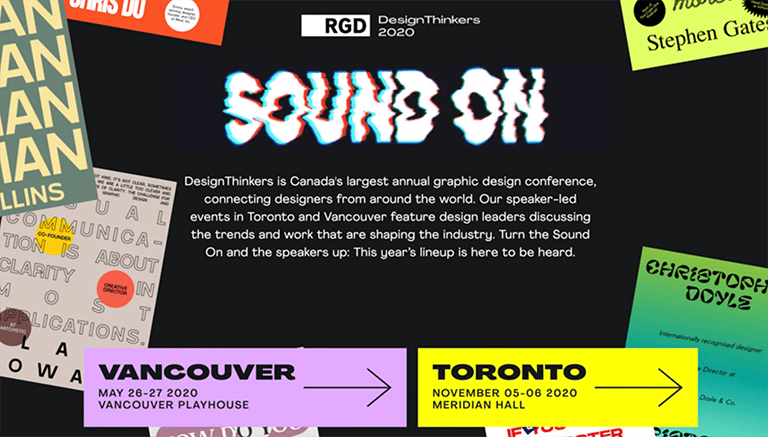
Creating an exciting and effective event website or webpage
Creating an event website can be a significant undertaking – but it’s one that’s worth it for many event organisers. In this section, we’ll talk about how you can make your event website stand out and be successful. Many of these points are relevant to event sections or pages on a business site too.
Search engine optimisation (SEO) for event websites
SEO is crucial for any successful website, not just event websites. It is the process of optimising your site to match user queries and communicating the value with search engines like Google and Bing. any event websites choose to ignore the importance of creating a well-optimised website for SEO – and in doing so, miss out on a lot of opportunity.
SEO is a complicated topic, so you may want to consider getting professional help with it. You can also check out this article for more detailed information on how you get your event website SEO ready.
In the meantime, there are some easy wins you can do to make sure your website ranks for relevant terms to do with your event.
SEO tips for an event website
- Find the keywords and queries that people search for that relate to your event. Then make sure you have pages on your event site that target these.
-
- This process is called on-page optimisation and is important to help search engines and users understand that your website is relevant to them. You can use the below tools to find what keywords people are looking for:
- Ahrefs
- Google keyword planner
- Keyword.ie
- Answer the public
- This process is called on-page optimisation and is important to help search engines and users understand that your website is relevant to them. You can use the below tools to find what keywords people are looking for:
-
- Optimise your metadata with keywords
-
- Metadata is the data that search engines read. It’s important to optimise it to show search engine bots what your website is about. More info on this here.
-
- Create meaningful content that your users will find useful.
-
- Good, well-written relevant content on your landing pages is crucial
-
- Structure your website in a logical way.
-
- Make sure each section of your website is structured well so that both search engines and users can navigate it with ease.
-
- Get local businesses and businesses that are involved in your event to link to your website
-
- Links that are relevant to your event will tell search engines that your website is authoritative. This will help your website to be ranked higher.
-
Event website design for user experience
Good website design is crucial to its success. Difficult to navigate websites can be off-putting to users and result in them leaving your site before they’re able to find the information they were looking for. This can impact your event’s authority and brand as well as attendance.
When it comes to designing an event website, you need to make sure your website is built with User Experience (UX), Conversion Rate Optimisation (CRO) and mobile-friendliness in mind. If not, you might end up struggling to attract attendees. Read on to discover how to design your event website in order to deliver a positive experience:
Event website design tips to boost ticket sales
- Make sure your website is built “Mobile first”
-
- This means that your website should be built with mobile use prioritised over desktop. This is because more users access the web on their phones, so making sure they get a good experience is crucial.
- Search engines also focus on mobile content and UX over the desktop experience. They will use your mobile site’s experience to decide where to rank your website. There’s more about mobile-first design here.
-
- Make sure your website is fast
-
- Site speed is really important for users. If they have to wait for a long time for your website content to load, they’ll quickly become bored and give up. This affects your brand reputation and potentially your event attendance. Search engines also favour quick sites and won’t rank slow sites. For more information, you can refer to this guide on page speed.
-
- Make it easy to perform key actions such as find out about the event, buy tickets, contact the organisers.
-
- While this may sound obvious, so many people get this wrong. And poor navigation can mean less event attendees. Making sure your website is easy to navigate is crucial to how it will perform for you as a marketing asset, so include clear call-to-actions throughout the site, and structure things logically. This guide from Hubspot has some great UX pointers.
-
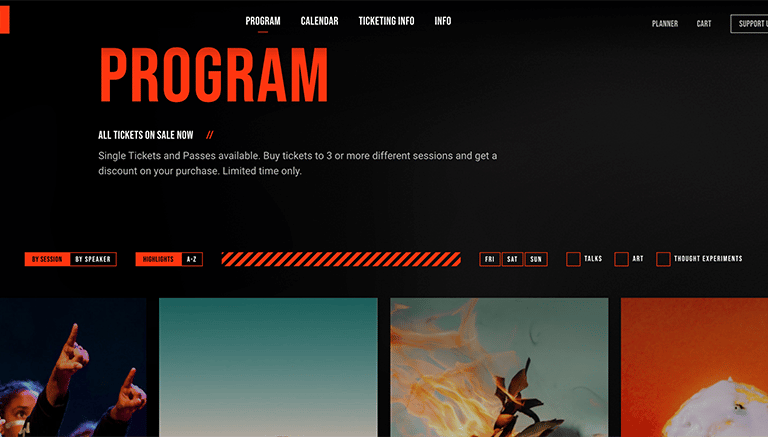
Using content to promote an event website
Content is a great way to get the word out about your event. In the online world, content can be anything from articles to images to videos – and using a combination of these formats will stand you in good stead for success.
For the full rundown, read our guide to content marketing for events.
Content can also be used across any of the event promotion methods we’ve discussed, whether that’s a dedicated event websites, web pages, Facebook events and event listings.
5 content marketings ideas to promote an event website
- Attendee testimonials
-
- Everyone loves testimonials. A good testimonial from a relevant individual can be a decisive turning point for someone who is considering attending but has yet to make the decision. If you’ve put on a similar event in the past, a testimonial page is an excellent idea for compelling content.
-
- Videos
-
- Videos have the power to tell stories in a compelling and direct way. They can also help someone imagine how the event might be, and sway them into attending. Videos can also be used across websites, youtube and social, making them a very dynamic type of content that can be used in many different ways. Read our guide to video marketing for event promotion.
-
- FAQs
-
- People will always have questions about your event – from the simple to the more complicated. By creating content that addresses these questions and concerns of potential attendees, you’re less likely to lose any attendance.
-
- Agendas, listings etc
-
- Make sure you include full details about your event speakers, what and when things will take place at the event. This can be in several formats such as video, slideshow, images – or a mixture of everything. The most important thing is to make this information the most focal thing about your online marketing. After all, that’s why people will want to go to your event!
-
- Blog posts
-
- No matter what your event is, there will always be something to write about that will interest your audience. For example, if you have speakers at your event, consider writing up an interview with them, or include a detailed bio. You can talk about the reasons for the event, or highlight your events USPs.
-
Event website inspiration
The internet is full of event websites. There are literally thousands littering the web – but not all of them are good examples.
If you’re looking for event website inspiration, there are different templates and examples available.
This article from medium looks at some of the most effective and attractive event websites, while the Awwwards also has a whole section dedicated to event websites.
Browse these articles to find a template and design that could work with your event, and go from there!
Promoting your event online
Whether you’ve decided to create an event website, add a page to your existing site, or are using Facebook events or another event listing site, there are lots of ways you can make sure people see the online version of your event. From paid social media advertising to Google ads, there’s an opportunity to promote your event online on a range of budgets.
Paid advertising tips to promote an event website
- Use search ads
-
- Search ads are a great way to capture people actively searching for your event – or events that are similar to yours. They allow you to appear at the top of the results pages for any keywords that you want. You pay each time someone clicks on your ad.
-
- Facebook Ads
-
- Facebook ads are an incredibly powerful way to sponsor your events. You can use them in conjunction with a Facebook event page to really increase its exposure, and target specific audiences based on their interests and demographics. We have a section on paid Facebook ads in our guide.
-
- Youtube ads
-
- Video is a really powerful way to advertise events. Videos allow you to tell stories in a compelling and visual way, and can be a key decider in whether or not someone wants to attend your event. Youtube ads offer a great way to get compelling video ads in front of relevant audiences.
-
- Instagram story ads
-
- Instagram is a huge channel with the same audience targeting available as Facebook. Story ads are a great opportunity to show more bespoke creative, whether that’s images, videos or text, and can be a great way to get people to interested in your event.
-
- Display ads
-
- If you have an event with little awareness built up, display ads are a great way to build your brand and get your event on the radar of your audience. Most commonly done via Google Ads, you can target people based on interest and demographics.
-
- Social media
-
- If you’re lucky to have a big organic following on social media, share your event on a regular basis across your social channels. While you won’t get the same defined targeting as paid social, you’ll see get some good exposure amongst an audience that is already aware and invested in your brand.
-
20 Bedford Way: event marketing experts
Marketing your event online via a website is a powerful and affordable way to get more attendees at your event. It’s also a great way to generate more event advocacy.
If you’re looking for a unique central London venue to hire for your next conference, event or training session, our affordable central London event venue is ideal. Our flagship Logan Hall has over 900 seats and is available to hire.
Come and take a look at our facilities and we’ll discuss how we can make your next event the best yet. Affordable, flexible and located in the heart of London, our spaces are perfect for a range of events. For more information, call us today on 020 7612 614.

